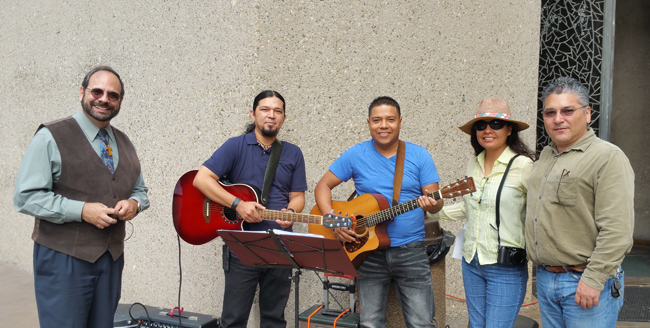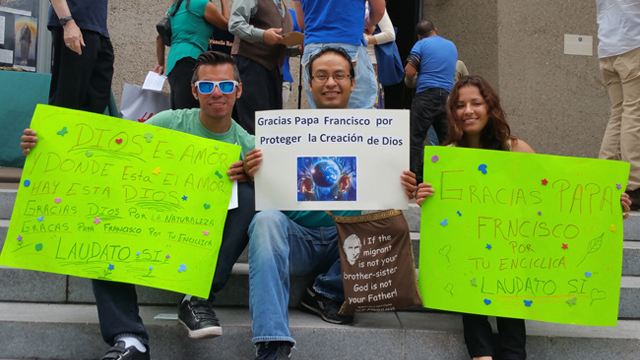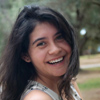This post originally appeared at Yes! magazine.
Two young men performed their songs on acoustic guitars in Spanish while the rally chanted along in front of St. Basil Catholic Church in Los Angeles.
After the June 18 release of “Laudato Si,” Pope Francis’ encyclical on the environment and humanity’s responsibility to protect it, young Catholics decided to host a rally to spread awareness of climate change’s effect on the poor, particularly Latinos in Southern California. Some Catholics are hopeful that events like this, inspired by the encyclical, will spread and lead to a new emphasis on climate action within the faith.
Members of the youth group Pastoral Juvenil of the Archdiocese of Los Angeles gathered in front of St. Basil on the morning of June 27 to share what was written in the encyclical and encourage onlookers to participate.
“When I started working on the issue of environmental protection at Holy Family Church in South Pasadena, it did not stir the emotions as it does now,” says Allis Druffel, who spoke at the rally. “It is the hope of my colleagues and myself that Los Angeles Catholic churches and households will become real leaders in what Pope Francis is calling for in ‘Laudato Si’ — to tackle the injustices of poverty, poor health and poor economic situations while caring for all of creation, both of which go hand in hand.”
Juana Torres, a 33-year-old volunteer at Pastoral Juvenil and one of the organizers of the rally, spent much of the day passing out petitions with demands she hopes can be addressed at the United Nations Climate Change Conference in Paris at the end of the year. For example, the petition called for nations to lower their carbon emissions and provide funding to protect people vulnerable to climate-related disaster such as storms, droughts, and floods. Every person at the rally committed to gathering at least 20 signatures.
“We want to make sure that our leaders are hearing us,” says Torres, who believes that climate change is near and dear to the hearts of many young Hispanics.
“A lot of us come from immigrant families, and a lot of families had to migrate in the first place because of the effect climate change has had in poor communities and keeping people in a cycle of poverty,” she said, referring to the impact climate change has had on farms and urban areas of Latin America.
St. Basil is not the only Catholic church in southern Los Angeles taking the Pope’s encyclical seriously. About 15 miles south, St. Emydius Roman Catholic Church stands around the corner of Martin Luther King Jr. Boulevard and Cesar Chavez Middle School — names associated with civil and minority rights.
But within a five-mile radius of the church, dozens of small factories contribute to making this part of Los Angeles home to some of the most polluted neighborhoods in the country.
This worries Father Juan Ochoa, a priest at St. Emydius, who says the pollutants in the area can harm children and pregnant women. It’s for that reason that Ochoa plans to share Pope Francis’ “Laudato Si” with his parish as soon as he can.
“Now that the document has been written, we have to put it into practice,” says Ochoa. “We have to discuss this as a parish and then change can take place.”
Ochoa says the encyclical is not a political document and is worried that many in his parish think it is.
“Most people, what they hear is just what’s in the news, and what’s being reported in the media is political,” he says. “The Pope isn’t making a political statement and he isn’t getting involved in American politics. This encyclical was addressed to the entire world.”
According to a recent Pew Research Center survey, 71 percent of US Catholics believe the Earth is warming, but only 47 percent believe it is a result of human activity.
The Pope’s encyclical contradicts that belief directly, claiming that humanity’s greed and violence has led to pollution and altered the climate.
“The violence present in our hearts, wounded by sin, is also reflected in the symptoms of sickness evident in the soil, in the water, in the air and in all forms of life,” Pope Francis writes.
According to the Environmental Protection Agency, southern Los Angeles has some of the highest levels of pollutants in the country. Since these areas are largely home to black and Latino people, the burden of this pollution tends to be carried by minority groups.

From left: Ramon Posada, chair of Creation Sustainability Committee for L.A. Catholic Archdiocese; two young men who performed at rally; Juana Torres, volunteer at Pastoral Juvenil; and Alberto Embry, director of Pastoral Juvenil for LA Catholic Archdiocese.
These environmental problems have many health consequences and lead to asthma, cancers, and learning disabilities, according to Patricia Juarez, an anthropology professor at the University of Texas at El Paso. Juarez teaches a course on environmental justice in minority communities.
“The development issues that result from pollutants often keep people in a cycle of poverty, keep them out of school or keep them isolated,” she says.
Juarez is optimistic that the Pope’s encyclical will encourage climate change doubters to look for more information, and applauds the Vatican for leading the effort.
Patrick Carolan, co-founder of the Global Catholic Climate Movement, an international coalition of Catholic organizations, agrees. “I hope and pray that Catholics will take a look at the encyclical and read it with an open mind and put aside any biases,” he says.
Ochoa at St. Emydius says he is praying for the same thing. He hopes that his parish can become more engaged in the discussion about climate change and wants to discuss a step-by-step plan at the next pastoral meeting, which the church will hold in July.
“I think our problem as priests is we haven’t discussed it with our parish,” he says. “It starts with us.”
But long before Pope Francis’ encyclical was released, Torres was already working with Pastoral Juvenil to engage young Latinos in the climate justice movement. She teaches a class on faith and ecology and often leads hikes where people pray in nature, for nature.
“For us, there’s no debate,” she says. “Pope Francis’ encyclical only validates the work we’ve been doing.”
Carolan thinks hope for the climate justice movement can be found in the newer generations.
“I think Pope Francis has already engaged younger people,” he says. “He’s helped a lot of young people connect with their spirituality, and sustainability is just one more way for young people to connect with their faith.”



